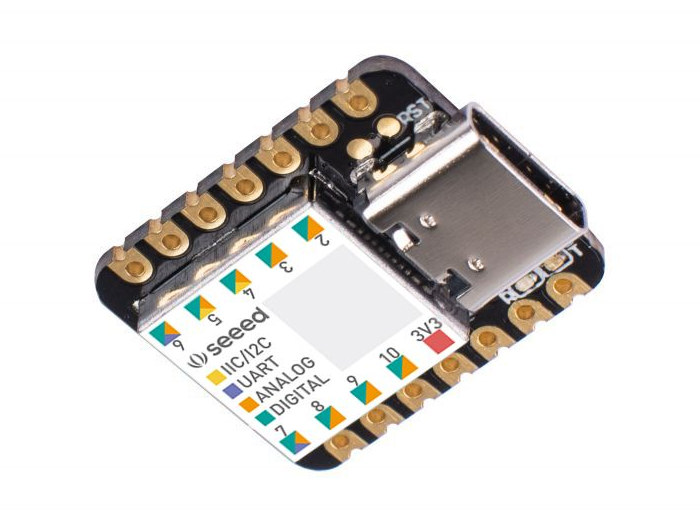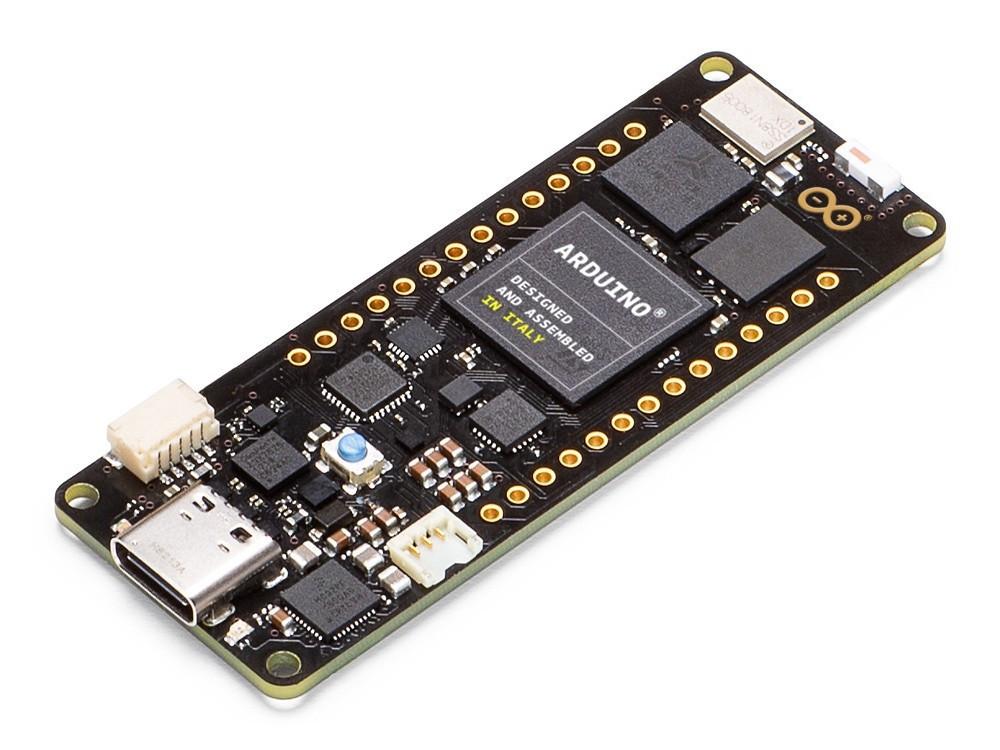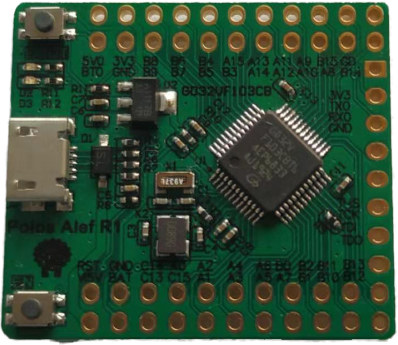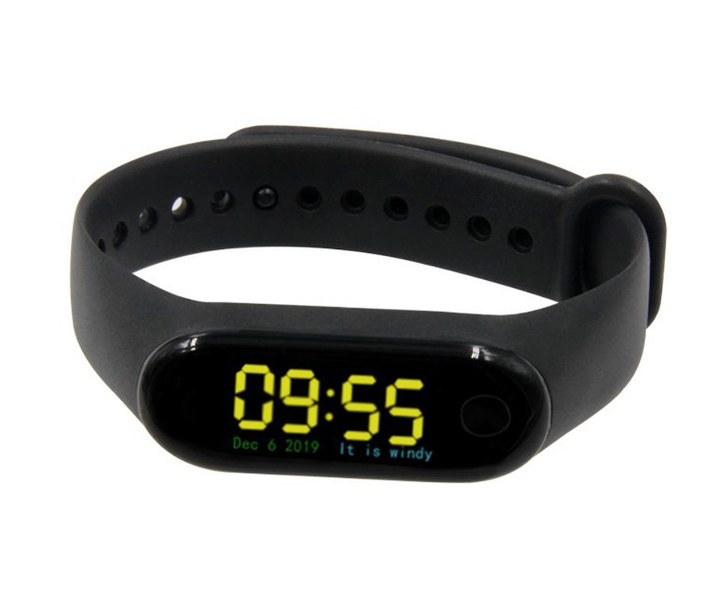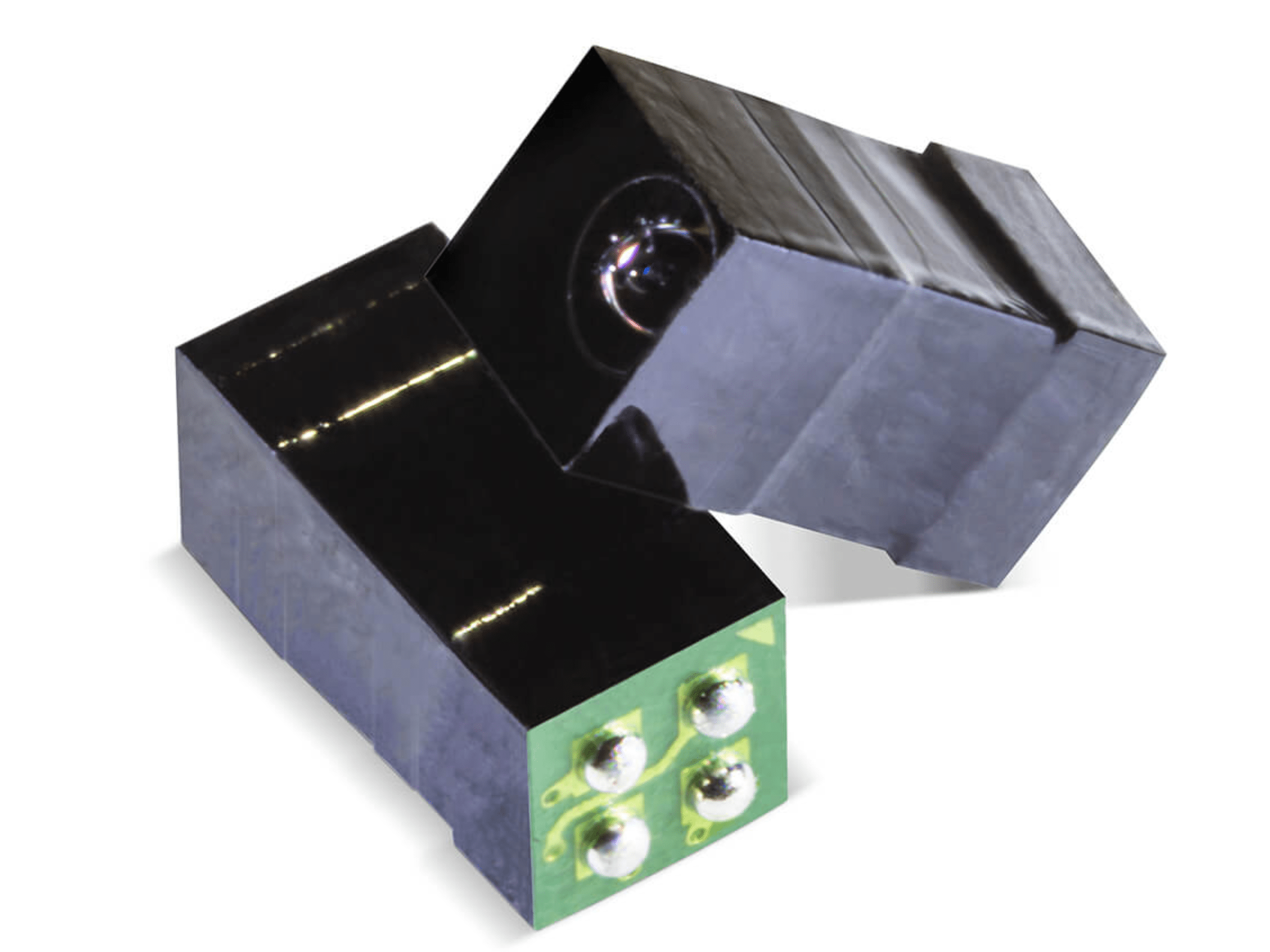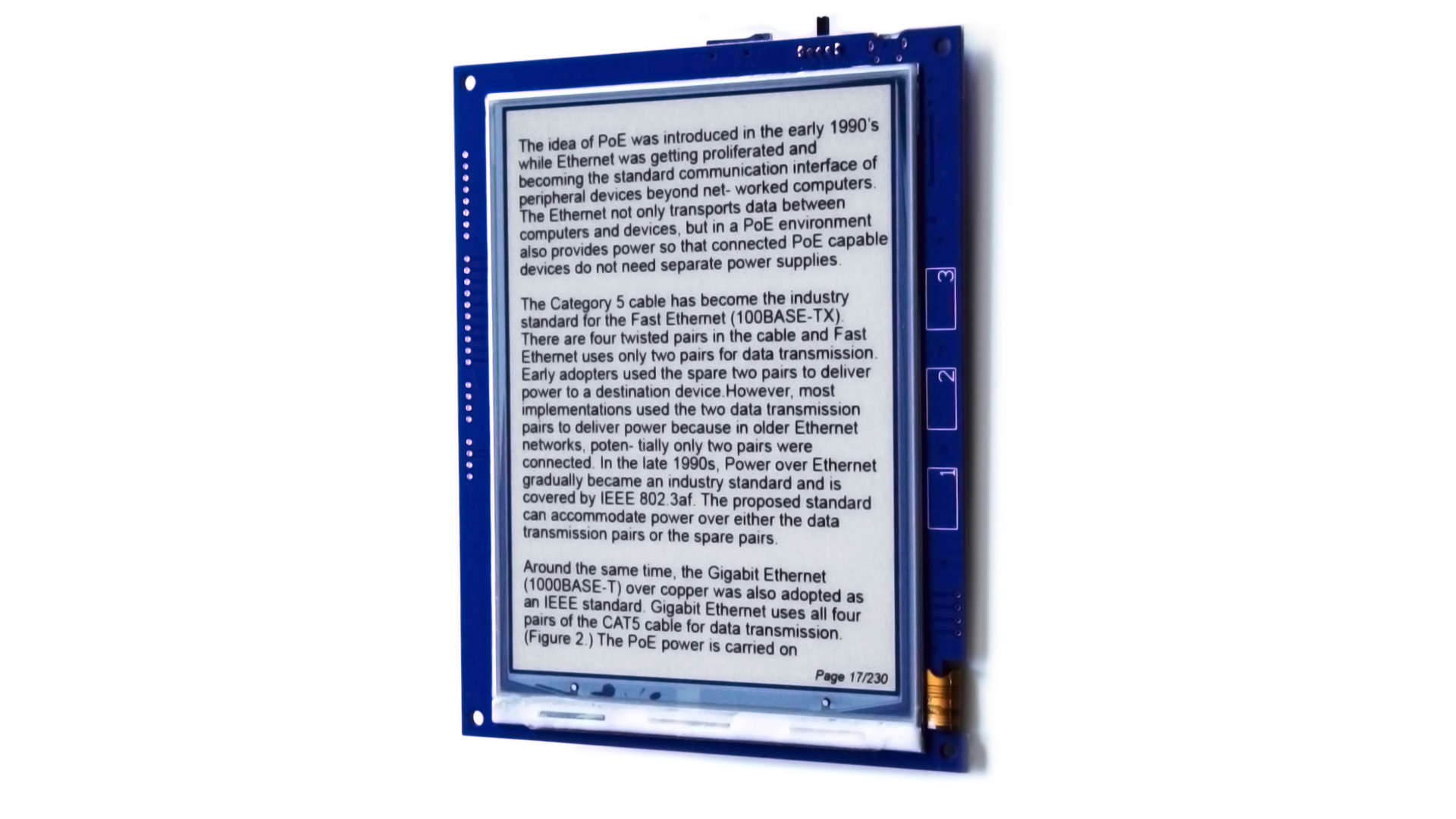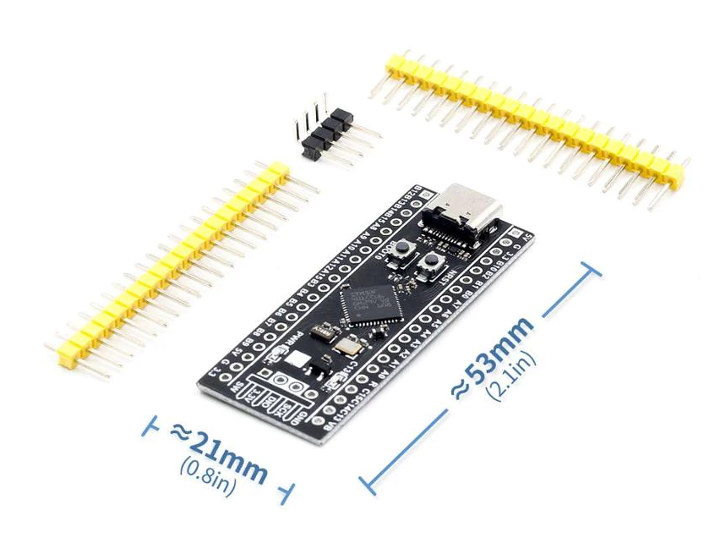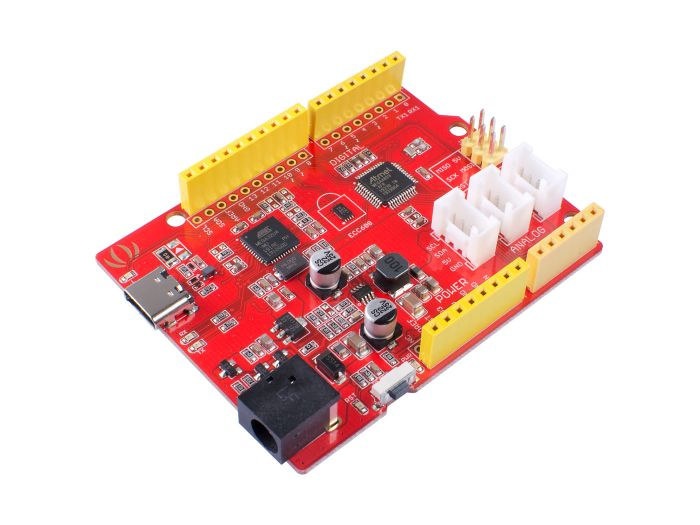Seeeduino XIAO is the smallest Arduino compatible board from SeeedStudio’s Seeduino family. Measuring just 23.5×17.5 mm, the board is equipped with Microchip SAMD21 Arm Cortex-M0+ microcontroller and exposes various digital and analog I/Os. Seeduino XIAO specifications: MCU – Microchip SAMD21G18 ARM Cortex-M0+ microcontroller at up to 48MHz with 256KB Flash,32KB SRAM USB – 1x USB type C port for power and programming Expansion I/Os 2x 7-pin headers with 11x analog inputs, 11x digital I/Os, 1x DAC, SPI, UART, and I2C 3.3V I/O voltage (not 5V tolerant) Misc – 1x user LED, power LED, 2x LEDs for serial port downloading, Reset pads, SWD pads, 32.768KHz crystal oscillator Power Supply – 5V via USB-C power, power pads (VIN/GND) for battery Dimensions – 23.5×17.5×3.5 mm All main components are placed under a shield, but there may be some charger chip (nope: see comments) as the company explains the board supports batteries via the […]
Arduino Portenta H7 STM32H7 Cortex- M7/M4 Industrial Board Runs Arduino Code, Python and JavaScript
Arduino is now at CES 2020 promoting its Arduino Pro all-in-all IoT solution for professionals with the Arduino Pro IDE, Arm Pelion IoT platform for device management, and a new Portenta industry-grade board family starting with Arduino Portenta H7 board powered by STMicro STM32H7 dual-core Arm Cortex-M7/M4 microcontroller. Arduino Portenta H7 Specifications: Microcontroller – STMicro STM32H747XI Cortex-M7 @ 480 MHz + M4 @ 200 MHz MCU with 2MB dual-bank Flash memory, 1 MB RAM, Chrom-ART graphical hardware accelerator System Memory – 2MB SDRAM (upgradeable up to 64MB) Storage – 16MB QSPI NOR Flash (Upgradeable up to 128MB) Connectivity 2.4GHz WiFi 802.11b/g/n up to 65 Mbps and Bluetooth 5.1 BR/EDR/LE via Murata 1DX module On-board 10/100M PHY Video I/F – MIPI DSI & 8-bit camera interfaces via 80-pin expansion connector, DisplayPort over USB-C port USB – 1x USB 2.0 Type-C port for power (PD), programming, and DisplayPort output I/Os Arduino MKR […]
Polos GD32V Alef is a Tiny RISC-V MCU Board Selling for $3
We first found out about GigaDevice GD32V 32-bit RISC-V MCU last summer, as an update/alternative to the earlier STM32 compatible GD32 Arm Cortex-M3 microcontroller from the company with higher performance and lower power consumption, while keeping the price identical. The first low-cost GD32V development board we covered was Longan Nano going for $5 with an OLED display and an acrylic case. If you don’t need either or want to access all pins from the 48-pin MCU, you can now order an even cheaper GD32V RISC-V MCU board with Polos GD32V Alef going for $2.99 on Analoglamb website. Polos GD32V Alef board specifications: MCU – Gigadevice GD32VF103CBT6 32-bit RISC-V (rv32imac) microcontroller @ 108 MHz with 128KB Flash, 32KB SRAM USB – 1x micro USB OTG port for power and programming Expansion – 52 through holes (2.54mm pitch) exposing all pins from the MCU including 3x USART, 2x I2C, 3x SPI, 2x […]
$18 TTGO T-Wristband DIY Arduino Programmable Smart Bracelet Features ESP32-PICO-D4 SiP
2020 is promising to be an interesting year for low-cost user-flashable smartwatches/bracelets. After the recent introduction of the $25 Pine64 PineTime Bluetooth enabled wearable companion for PinePhone Linux smartphone that will support various real-time operating systems such as Zephyr OS or FreeRTOS, we’ve now been informed that Liliygo launched TTGO T-Wristband smart bracelet powered by Espressif Systems ESP32-PICO-D4 SiP. The watch comes with 802.11 b/g/n WiFi 4 and Bluetooth 4.2 Classic+LE connectivity and is currently selling for under $18 and up on Aliexpress and Tindie. TTGO T-Wristband smart bracelet specifications: SIP – ESP32-PICO-D4 system-in-package with ESP32 Tensilica LX6 dual-core processor, clocked at 240MHz, 520 KB SRAM, 802.11 b/g/n HT40 Wi-Fi, integrated dual-mode Bluetooth (classic + low energy) Display – 0.96″ IPS color display Antenna – WiFi / Bluetooth ceramic antenna Sensor – Invensense MPU9250 9-axis motion sensor Expansion / Programming Interface – 0.3pitch 13-pin FPC socket Misc – NXP PCF8563 […]
NanoVision & NanoBerry Miniature Computer Vision Evaluation Kits Released For Arduino & Raspberry Pi Platforms
AMS (Austria Mikro Systeme) known for their array for micro sensing solutions and most importantly the NanEye, a Miniature CMOS image sensor which is designed for applications where size is a critical factor has also launched a set for evaluation kits called the NanoVision and the NanoBerry for the development of solution based on the AMS NanEyeC miniature image sensor. NanEyeC Camera Sensor The NanEyeC comes in a footprint of just 1mm x 1mm surface mount, and it can produce 100kpixel resolution up to 58 frames/s. It seems the NanEyeC is based on the NanEye series, which typical (NanEye) features a 249×250 resolution with a high sensitive 3um x 3um rolling shutter pixel and capable of a high frame rate of about 43fps to 62fps. The NanEyeC sensor is based on the high-speed LVDS data interface. The sensor is assembled with a unique lens and cover glass, which fits in […]
Inkplate 6 ESP32 Wireless e-Paper Display Recycles Kindle E-reader (Crowdfunding)
Inkplate 6 wireless display is made from recycled e-Paper display taken from a used Amazon Kindle E-reader and adds WiFi (and Bluetooth) connectivity thanks to an ESP32-WROVER module featuring Espressif Systems ESP32 dual-core processor. The 6″ e-Paper display can easily be updated over WiFi, and used for a variety of applications or projects such as high-latency digital signage displays, collaborative task trackers, e-Paper typewriters, open-hardware E-readers, art projects and so on. Inkplate 6 specifications: ESP32-WROVER wireless module ESP32 dual-core Tensilica LX6 processor @ 240 MHz 8MB RAM, 4MB flash Connectivity – 802.11 b/g/n WiFi and Bluetooth 4.2 Display – 6″ e-Paper Display (ED060SC7) with 800×600 resolution taken from discarded Kindle readers; refresh time: 0.264 s; partial updates possible Storage – MicroSD card socket USB – 1x Micro USB Port for power and programming (via CH340C) Expansion EasyC / Qwiic connector with I2C Headers for power signals, I2C, SPI, ESP32’s GPIO, […]
$3 STM32 “Black Pill” Board Features STM32F4 Cortex-M4 MCU, Optional SPI Flash
STM32 “Blue Pill” is a popular, and cheap (>$2) development board based on STMicro STM32F103C8T6 Arm Cortex-M3 microcontroller and programmable with the Arduino IDE. I’ve just been informed the board got an upgrade of sorts with a “Blue Pill 2” board featuring either STM32F401CCU6 or STM32F411CEU6 Arm Cortex-M4F microcontroller, and a USB Type-C port for power and programming. It’s black, so instead, I’ll call Black Bill as some others appear to do. Specifications for the Blue Pill & Black Pill boards (new features in bold): MCU (one of the other) STMicro STM32F103C8T6 ARM Cortex-M3 MCU @ 72 MHz with 64KB flash memory, 20KB SRAM. STMicro STM32F401CCU6 Arm Cortex-M4F MCU @ 84 MHz with 256 KB flash, 64KB SRAM STMicro STM32F411CEU6 Arm Cortex-M4F MCU @ 100 MHz with 512KB flash, 128KB SRAM Storage – Footprint for SPI flash USB Blue Pill – 1x micro USB port for power and programming Black […]
Seeeduino Crypto Board Combines Microchip ATmega4809 MCU and ECC608 Crypto Chip
With the advance of IoT, security has become critical since devices are often connected to the Internet. There are several ways to improve security and one of them is to implement hardware security via crypto chips. One of those chips is Microchip ECC608 (aka ATECC608A) secure element which we previously found in Linux based hardware such as USB Armory MK-II USB Linux computer, and the official Arduino Nano 33 IoT Board. Seeed Studio has now introduced a new Arduino compatible board with Microchip ECC608 crypto chip: Seeeduino Crypto board powered by a Microchip ATmega4809 8-bit AVR MCU. Seeeduino Crypto specifications: MCU – Microchip ATMEGA4809-AFR 8-bit AVR microcontroller @ 16 MHz with 48KB flash, 6,144 Bytes RAM USB – 1x USB Type-C port Expansion Arduino Uno headers with 6x analog inputs, 14x digital I/O pins, 5x PWM 2x I2C Grove headers 1x UART Grove header HW Security – Microchip ECC608 secure […]


